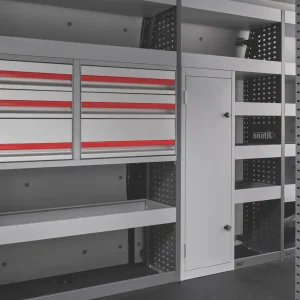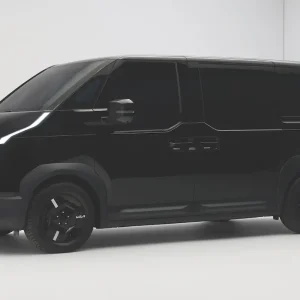If the new Combo light van is anything to go by then Vauxhall has a bright future now that the brand is part of the PSA Group.
The Combo, alongside its sister products, the Peugeot Partner and Citroen Berlingo, burst onto the scene late last year and promptly scooped both the International Van of the Year and the What Van? Light Commercial Vehicle of the Year prizes for 2019.
PSA is putting light commercials centre stage, as Derek Wilson, LCV director says, “Vans are central to our plans in the next few years.”
He admits there was room for improvement when he adds: “[The Combo] was our biggest under-performer with the previous model,” which was based on the same platform as the Fiat Professional Doblo Cargo.
There is a new energy and optimism around Griffin House, Vauxhall’s Luton HQ, and Wilson says the brand is looking for a 25% increase in LCV sales in the next 12 months.
But despite the Combo’s impressive debut, CV product manager Brad Miller stresses that the Vivaro medium van – the next version of which will go into production in June based on the Citroen Dispatch and Peugeot Expert, although order books open in February – will remain the best seller.
Unlike the previous Combo, the current Vivaro, based on Renault’s Trafic, has been a success. As recently as 2016 Vauxhall shifted 28,000 units of the model.
Vauxhall will continue to build the new Vivaro in Luton and Miller says: “The plant is a significant USP.”
In its heyday prior to 2012, when the Doblo-based Combo launched, Miller says sales of the light van topped 15,000 a year and the aspiration is to get back to this level.
It’s a big leap – last year Combo sales slumped to 2,539, although the new model did chip in with 191 registrations when it hit showrooms in November.
But Wilson claims Vauxhall had taken 4,000 orders for the new Combo by mid-January, “so it’s ahead of the old one already”.
The brand believes it now has a product that is leading the market on price, features, safety and economy and it has its sights set on returning to the top three of the sector.
Wilson acknowledges the boost that being crowned What Van?’s LCV of the Year has given the Combo.
“Winning the most prestigious domestic award is as good as it gets,” he says.
With the Vauxhall brand aiming to make a comeback having lost some ground in the market in recent years, Wilson says there has been an uplift in its marketing spend across all channels, including TV, radio, digital and the press, and adds that they can use “the highly recognisable [What Van?] logo” within its campaigns.
Vauxhall has traditionally enjoyed a broad customer base, across both fleet and retail, and Miller points out the current Vivaro outsells both its sister vans, the Renault Trafic and Nissan NV300, in the UK. With the weight of the brand’s heritage behind it, it would not be a surprise if the forthcoming Vivaro were to repeat this feat in the domestic market compared to the Dispatch and Expert.
Under the guidance of PSA, the manufacturer is seeking to step up its LCV focus in retail sales and aftersales.
This year it has launched 65 dealerships as Van Business Centres, having carried out the preparatory work in 2018.
These centres must adhere to defined standards and although many were already van specialists under the pre-PSA regime, Wilson admits that not all of the former van specialist sites were as focused as the job requires.
But he says it was not a case of ripping up the network but rather of finding the right balance.
“Sixty-five gives us geographical coverage,” he explains. “It’s not too many sites – we want vans to be integral to the sites.”

The award-winning Combo
With the cost of real estate a crucial consideration it was important not to have too many dealerships, and for the same reason cars are also retailed from the same locations.
Wilson candidly admits that with Vauxhall now belonging to the same group as Citroen and Peugeot, it would not make economic sense to view the other PSA brands as direct competitors, “so we will target third-party competition”.
After all, as Miller points out, the manufacturers will be pooling their resources in projects such as a national conversion partnership.
“We are working together with one voice,” he says. “We don’t want to cannibalise sales. It’s not best for the group.”
Miller believes PSA’s expertise in conversions will enhance Vauxhall’s product portfolio and argues that less resources are needed if the three brands partner with the same converters.
Wilson says joining the PSA group, which he claims commands a market-leading 25% share of the European LCV market, has triggered a “mentality change” at Vauxhall by bringing “a level of focus [onto the LCV business] that was not there before”.
A Vauxhall stalwart that will not be getting a PSA makeover in the immediate future, however, is the large Movano van. In fact, it will be getting a facelift in line with its current donor model, the Renault Master, this September.
Further down the line it would seem logical for the next generation of Vauxhall/Opel’s large van to move onto the same platform as the Peugeot Boxer and Citroen Relay, but Vauxhall has not confirmed this as yet.
At the other end of the scale, last year saw Vauxhall cease production of its Corsavan, following the withdrawal of its other car-derived van, the Astravan, in 2013.
The move came just before Ford performed a U-turn by reviving its Fiesta Van, which surprised Miller, who questioned whether there was a viable business case for the decision.
Vauxhall sold just 2,500 Corsavans in 2018 and when asked about the possibility of a replacement, he says: “It [would have] to be a functional CV to be a rational successor.”
Concurring that there is no room for sentiment, Wilson adds: “There needs to be a proper opportunity, rather than it’s just nice to have.”
This fits in with the PSA strategy, which, according to Wilson, brings two versatile platforms to cover the whole vehicle range, in contrast to the nine used when Vauxhall/Opel was part of General Motors.
“There’s much more synergy, you don’t have to create new platforms,” he explains.
With Brexit uncertainty still casting a cloud over the industry, Wilson says PSA took an important and brave decision in choosing to keep Vivaro production in the UK.
“We think there are plans to cover the most likely scenarios,” he says.
Vauxhall is committed to launching a fully electric Vivaro by 2020 and believes the fiscal benefits for plug-in vans will increase going forward, with Transport for London planning a scrappage scheme to encourage their adoption and up to 30 local authorities looking at introducing ultra-low emission zones.
By 2020 all manufacturers will have to meet the European Union’s legislation of delivering average LCV CO2 output of up to 147g/km or face extensive fines.
“As a group we are as prepared as we can be,” claims Miller. “We will meet the target, we are not countenancing heavy EU fines,”
Within a 14-month period from November 2018 Vauxhall will have launched a new Combo, a new Vivaro, a facelifted Movano and an electric van, but the brand is enthusiastic about the challenges ahead.
As Miller puts it: “We’re not getting the deckchairs out.”






